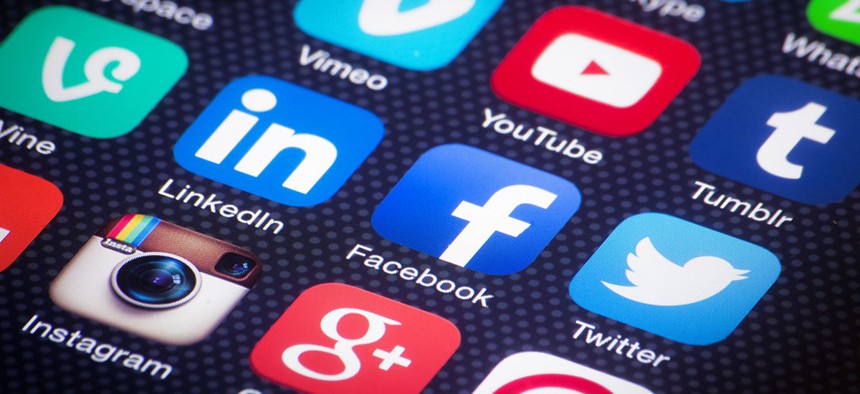I’m Taking a Social Media Break for My Sanity—And So Should You

Twin Design/Shutterstock.com
Taking a step back from Twitter and Facebook can boost your mood.
Long before social media existed, I had a flourishing career as a magazine editor-in-chief and widely published journalist.
Before Facebook, Twitter, Instagram and LinkedIn, the only way I had to “build my platform” was to appear on TV and radio shows, and share my clips by emailing my friends and colleagues the PDFs. Later, upon the advent of Facebook and other sites, I developed an online presence by curating content on Twitter, starting a blog, publishing articles and reported pieces and joining hundreds of Facebook Groups.
I am a huge advocate of social media for the sake of community, resources and networking. But today I also follow certain social media rules: No rant posting, because I know the "vents" of today are the [bad] memories of tomorrow. No sharing fake news. Always ask my husband or daughter for permission before I write about them online. I also believe friendships and strong connections require face time (not just FaceTime).
However, a month ago, amidst election drama, celebrity deaths and economic upheaval, I was coming across a lot of desperate, anxious, inappropriate postings that were causing me mental, emotional and physical anguish.
I can usually weather the unrelenting fundraising requests, excessive oversharing, toxic workplace gripes and #ImwithHer (hate him) chatter. But I noticed a shift in the tenor of political posts; and with each increasingly alarming rant I internalized my own stress more deeply. Soon, I struggled to sleep, suffered from back pain and headaches, caught colds and couldn’t focus. If I’d been wearing my mood ring from childhood, the stone would have turned black from aggravation.
Turns out, I’m not alone. According to a new study by the American Psychological Association Americans are more stressed out than they have been in the past decade—particularly by today’s political climate, and concerns about terrorism and personal safety. I think actress Cecily Strong best summed up our mindset in a recent "Saturday Night Live" skit; playing a judge in "People’s Court," she says to president Trump, “I want one day without a CNN alert that scares the hell out of me.”
Seeking a solution, I did some research and found studies and articles proving why too much social media can be detrimental to one’s health.
- Depression: The longer young adults spend on social media, the more likely they are to be depressed because of the false lives they create and curate online, according to a study from the Journal of Depression and Anxiety.
- Loss of Focus: Ad Week reported the average attention span 10 years ago was 12 minutes—today, it’s 5 seconds. The feeling you get from likes and comments on your posts is addictive, and this Pavlovian-like conditioning makes you go back again and again to ring that proverbial bell. Over time, you lose focus, changing the way your brain works so you can’t give longer form tasks your full concentration. In fact, an op-ed in The New York Times posits that we should get off social media and that we will find success and fulfillment anyway if we just work hard on our craft and market it in a way people care about.
- Prevalence of Eating Disorders: A recent study in the Journal of the Academy of Nutrition and Dietetics found young adults who spent the most time on highly visual social media had over two times the risk of eating and body image concerns.
- Bye to Memories: A study on the rise of digital amnesia suggests we are losing our memories (and ownership of them) when we trust digital devices to store information and remember things for us.
- Less Productivity: I worry that going back and forth, switching from one task to another (tweeting, watching videos, posting and commenting) is decimating my intellectual ability. We know multitasking increases the production of the stress hormone cortisol and adrenaline, which can cause scrambled thinking (also known as mom brain). Our brains need downtime to absorb the data we are constantly bombarded with so we can process information.
So I made a decision (and announced it on Facebook in a perfect dichotomy), that I would be putting myself in a social media “time out” for two to three days every week. At first, my FOMO was strong, but then I reminded myself that social media, much like your favorite soap opera, is the party that’s always on.
Since I put myself on a social media detox, I’ve noticed my mind is clearer, my ideas flow, and I find the mental and emotional “space” I need to be present in my life.
I wish I could give it all up like freelance writer Antonia Malchik, who decided to get off Facebook for good “to get my fractured attention back,” despite finding value in online communities.
“I was listing the things I value in my life, like honesty, kindness, giving back to the community and quality time with family, and I realized that ‘social media’ didn’t appear on any of my lists. It was a big red flag for me,” she said.
My new rule is not to visit any social network more than three times a day (which is still a lot, I know). If my will power wanes, I plan to check out the apps and extensions like StayFocused, Block Site and Nanny, which allow you block distracting websites, or set daily time limits for each site.
In the meantime, I’m headed out of town on vacation soon. I won’t be taking my computer and I’ll be muting my notifications on my phone—because even if our president appears unable to focus on a single task, and is clearly addicted to social media stimulation, I don’t need to be.





